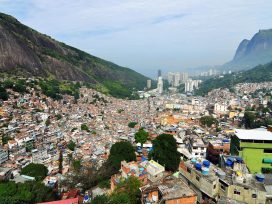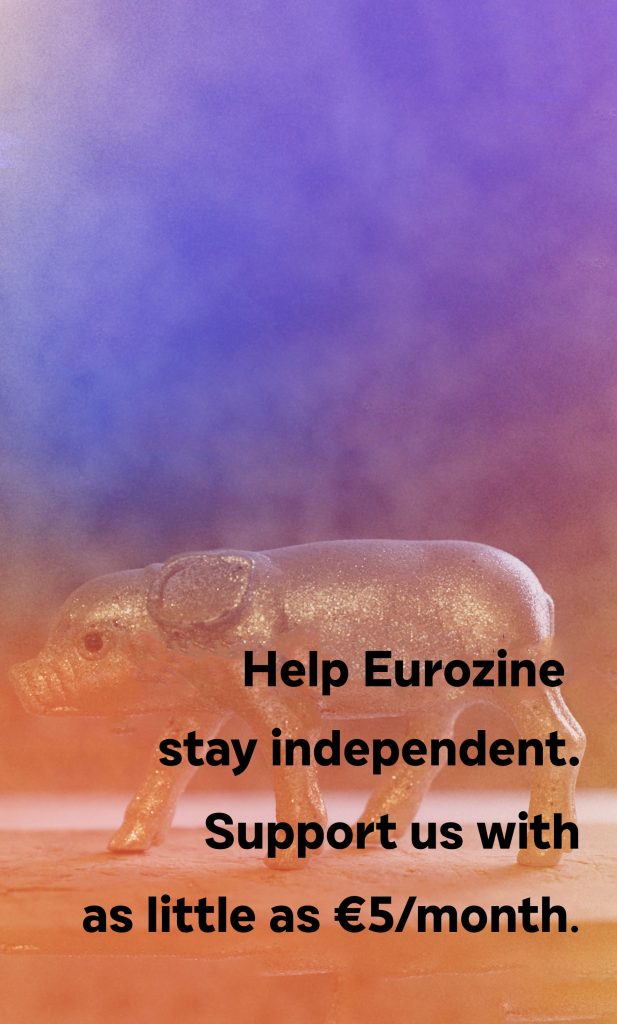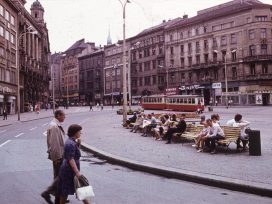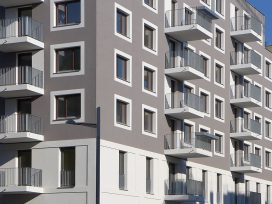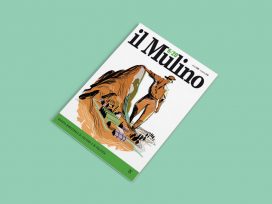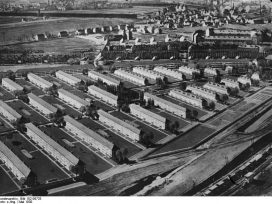In 1936 when the famous literary historian and critic Arne Novák pondered on what Brno had ever given to literature and what its cultural weight was, he had to conclude that there actually was not that much of it: the beautifully wrinkled landscape around the city, some churches, an occasional palace. But otherwise, Brno had been “a mere provincial suburb of the German city of Vienna”. In Novák’s opinion, one of the causes of this condition was the fact that “Brno lacks a more substantial presence and the friendlier participation of the most melodious of the elements – water.” “There’s no waterfront here,” Novák continues, “where a tired worker could rest, a dreamer on a long walk could muse, and an architect could look for the right distance to get the necessary perspective or a multiplying mirror for more monumental structures.” Yes, Brno does have two rivers, but those are totally purloined by the industrial facilities, primarily textile ones – in other words, those watercourses “don’t hum and murmur, nor entice and sing”.
Brno had long been known as the “Austrian Manchester” and this is still the more flattering appellation. The less flattering one was “Floridsdorf,” after the industrial/working-class suburb in the north of Vienna. The First Republic (1918-38) did give it certain cultural self-confidence. Its Czech element began to assert itself to a much larger extent. Several jewels of functionalist architecture were built (the Avion Hotel, the Tugendhat villa and others), whose importance goes far beyond the scope of Brno and the whole country. It used to host the most remarkable interwar daily newspaper (Lidové noviny), among whose contributors were leading Czech writers. The Nazi Protectorate (1939-45) and the events that followed it led first to a strong alienation of the Czech and German elements and subsequently to the expulsion of the Germans from the city. The communist era (1948-89) didn’t really know how to go about Brno. Factories kept on expanding, so Brno stuck continuously to the line of a predominantly working-class city from the times of the Austrian monarchy. It was assigned the role of one of the ten administrative regional centres. As regards the official population figures, it was overtaken by Bratislava, the second capital city of the socialist federal Czechoslovakia – this was achieved by means of artificially bolstered housing construction and the administrative attachment of villages.
In other words: Brno – the third city of Czechoslovakia, the second city of the Czech lands and the first city of Moravia. But first of all, a city suffering from a self-lacerating complex towards Prague and feeling that it had also suffered a wrongdoing at the hands of the artificially enlarged Bratislava. And it did not feel all that self-confident in the position of the first Moravian city, as there has always been Olomouc, which – though notably smaller – is more architecturally impressive. The years following 1989 have brought a tremendous shrinking of the industrial plants, which has been accompanied by the growth of the student element. Brno’s footprint in the printed word has been growing: publishing houses, magazines, and printing houses. As though the city has finally started taking advantage of its opportunities – so after the fall of the Iron Curtain, it has yet again turned out to be a shorter way to Vienna than Prague.
*
Arne Novák died in 1939. Had he lived two more years, perhaps he wouldn’t have been able to defend his thesis. The reason for this is that in 1941, the collection Melancholické procházky (literally “Melancholy Walks”, also known in English as Brno Elegies), by the young poet Ivan Blatny, was published, a collection fully dedicated to Brno, which raised an immortal monument to the city. And at the end of the war, this monument was extended by another collection dedicated to Brno, although this time to its everyday, dark side (Tento vecer, “This evening”). Even the rivers, which Novák saw as merely water supplies for factories, were uncovered as poetic places by Blatny. Following 1948, Blatny ended up in exile in England, but even there (in the psychiatric hospital where he was placed) he was able to write, and a large proportion of this poetry related to Brno, especially to the Brno of the late 1930s, as it was retained in the poet’s memory of emotion.
After Blatny, other poets with a strong connection to Brno emerged – they’ve managed to incorporate Brno into their verse not as mere poetic patriots, but in a much more substantial way. Of these, Jan Skácel and Oldrich Mikulásek are the greatest. But there are many others we might name: Klement Bochorák, Zdenek Kriebel, Zdenek Rotrekl, Ludvík Kundera, Zdena Zábranská, Vít Slíva, Martin Reiner… Brno has even won a reputation as a “city of poets”. As if, since the days of Blatny, there has been some kind of lyric essence flowing in this city, an essence that can’t be found elsewhere. At the same time, this essence is seen as something intrinsically tender, reconciliatory. In Brno, you can still enjoy some balmy poetry writing and even afford to be naive, while in Prague you have to be trendy, up-to-date, well informed, and knowledgeable.
*
Epic and prose lag significantly behind, although several works, which started appearing at the turn of the twentieth century, are worth mentioning. They capture Brno’s social issues (Josef Merhaut), deal with Brno’s periphery (Rudolf Tesnohlídek), and try to discover something else behind the city’s famed greyness (Jirí Mahen). In recent years, Brno has found its prose-writer in Jirí Kratochvil, who – with methodical obsession – flings himself onto the city, tenaciously endeavouring to turn it into a magical place. And there is also the novel by the young prose-writer Katerina Tucková, drawing on the powerful, if up to now lying fallow, topic of Czech-German relations (the War, the expulsion of the Germans, lost memory): Vyhnání Gerty Schnirch (The Expulsion of Gerta Schnirch). However, a work in prose that would become an immortal monument, one in which the city would permeate the text and in which it would be clear that it could be no other city, simply does not exist.
No, unlike Prague, Brno doesn’t have its Trial (Franz Kafka), a space in which real topography merges with the magic. And although there is the potential source of topics stemming from the social issues, it doesn’t have – unlike Chicago – its Jungle (Upton Sinclair); nor has the era of the textile industry bestowed on the city its Promised Land (Wladislaw Reymont), as did on Lodz. Neither has its nationalist gyrating delivered Shosha, as was the case of Singer’s interwar Warsaw. Nor has Brno’s topography been so naturally embodied in storylines and characters like that of New York City in Salinger’s Catcher in the Rye, or that of Moscow in Bulgakov’s Master and Margarita. None of Brno’s neighbourhoods have fascinated a portraitist as the IX district of Vienna did Heimo von Doderer (The Strudelhof Steps). Nor does Brno have any portrait of its olden days, in the fashion of, for example, Aleksandar Tisma who depicted them captivatingly in several novels for the Vojvodinan city of Novi Sad (e.g. in The Use of Man). It would seem as if the city was lacking in epic potential. Or is it the case that it has not yet found the writer able to turn that potential into a real epic work? Both options are valid, but the first one is more probable…
*
And what about Brno’s greatest literary son? Milan Kundera was born in Brno, wrote in Brno and even dedicated two of his short stories in Smesné lásky (Laughable Loves) to Brno. As it happened, it was just those two stories that the author left out when he subsequently reviewed the work (converting three small books into one). In the “canonical” Laughable Loves, as foreign readers know the collection, and as it was republished in Czech after November 1989, you won’t find the short stories “Sestricko mych sestricek” (“Sister of my sisters”) and “Já, truchlivy buh” (“I, mournful god”). It’s a pity. They’re charming, thoroughly Kunderaesque and, what’s more, they both take place in the author’s native city. Brno is not just a backdrop in front of which some amorous conflict unfolds. In these stories, the author acknowledges Brno.
It’s space rather than time that is rendered in a more concrete way. Timewise, we go back to an imprecisely defined period of post-war Czechoslovakia, roughly in the late Fifties or early Sixties. But as regards space, there’s no doubt we are in Brno. The heroine, Jana, tells the narrator who pretends to be able to speak Greek: “Ask the Maestro whether he likes Brno.” In both stories, the narrator wanders through Brno’s neighbourhoods: “I’ve shown her the village street that runs from Zabovresky to Komín.” “I was roaming through the streets of Královo Pole.” Brno’s cultural institutions are present here: the Bellevue café, the Opera, the conservatoire, the House of Arts. The characters do a lot of walking and so even one of Brno’s rivers appears (“I used to go to the bank of the Svratka”), which – as we know – were dismissed by the critic Novák in 1936 as not having a melodious power. Moreover, the narrator of the first short story discovers picturesque recesses of the outlying neighbourhoods around the Svratka and the narrator of the second short story is – as if to spite Novák – a music composer.
Brno is all over these short stories and it’s not only the topography in which the city is present. One of the characters of the second short story is a Greek, a former partisan, who had fled Greece after the military coup in 1949. Brno was a place where a large number of Greeks like him settled. This Greek immigration has left a significant footprint on Brno’s culture, especially among musicians and artists. The explanation the narrator offers for the Brno mission of the Greek partisan, whom he presents as the conductor of an Athens opera for the purpose of his plot, is that the Maestro is coming back from a tour in Germany and has stopped in Brno to “study the score of Janácek’s Destiny“. So here we have Janácek – the most famous of all Brno’s composers. In the short story “I, mournful god”, Brno is not only the place that is talked about, but also the place where the narration takes place. The narrator tells someone the following: “You’ve only been here in Brno one day and you are already touching, albeit only as a viewer, the interesting stories of this place.” It’s also revealed as the narrator’s home city (“The cultural officials of my city”).
These short stories are Kunderaesque to the utmost: the happier people are not those who are more streetwise, but those who don’t know. The world of reflection and reason and the world of naivety and exaltation cannot understand one another. A game that was laid as a snare for somebody misses its goal, and no satisfaction is given. To sum it up: the world of desire and the world of playing games cannot be reconciled. But why, then, didn’t these two short stories end up in the authors canon? And isn’t Brno to blame at the end of the day?
I think that the city is to blame to a large extent. When Kundera’s works are translated to other languages, he suppresses the realia. And in the case of these two short stories, it’s hardly possible. They’ve grown into Brno and Brno has grown into them. The city is their story-making power. And what’s more, the short story “Sister of My Sisters” is also largely stuck in lyric style. And it’s lyric style that the “canonical” part of Kundera’s work is in polemics with. The affection for a charming medical student, excursions to the green environs of Brno, meeting singing old women there (“in the voice of archaic countryside that resonated almost in the middle of the city”) – all this constitutes the elucidation that provides the narrator (a composer) with a moment of creative inspiration. Kundera’s narrator even has to undergo a twofold initiation. From a weary routinist at the age of Christ, he first turns into a romantically enticed creator under the onslaught of emotions and folklore, who realizes that from now on, he has to write in a different way. The second initiation takes place when the woman he writes his new composition for refuses it. The most important fact is not that she refuses it but the way she refuses it: saying that any art has to be healthy, that any human activity should be medical science, and that an artist shouldn’t be a bohemian… And now it’s clear. Kundera’s narrator has been cured by the medical student’s naivety, her exalted vigour, as well as her professorial attitude. That is, by discovering that all that preceded (the first, romantic initiation) was just a deception. He’s both the loser and the winner. He fails in the field of love and as an artist, but on the other hand, he comes to understand things.
*
However in Kundera, Brno is not both loser and winner. In the battle with the author’s canon, it lost – it didn’t make it on board. Nevertheless, it has yielded two unforgettable short stories.
